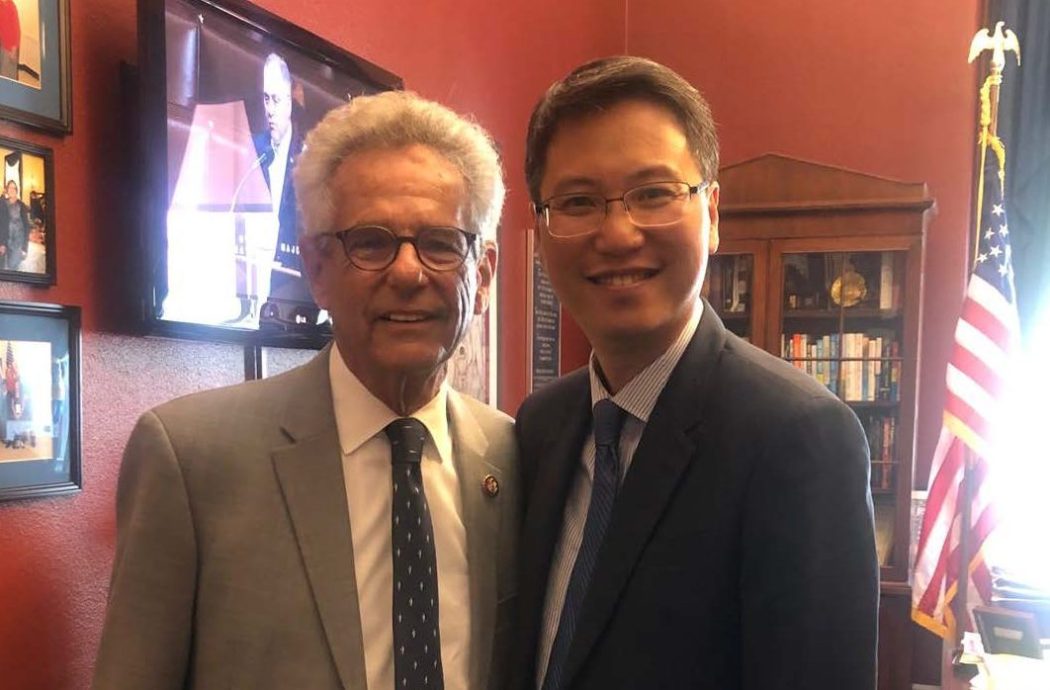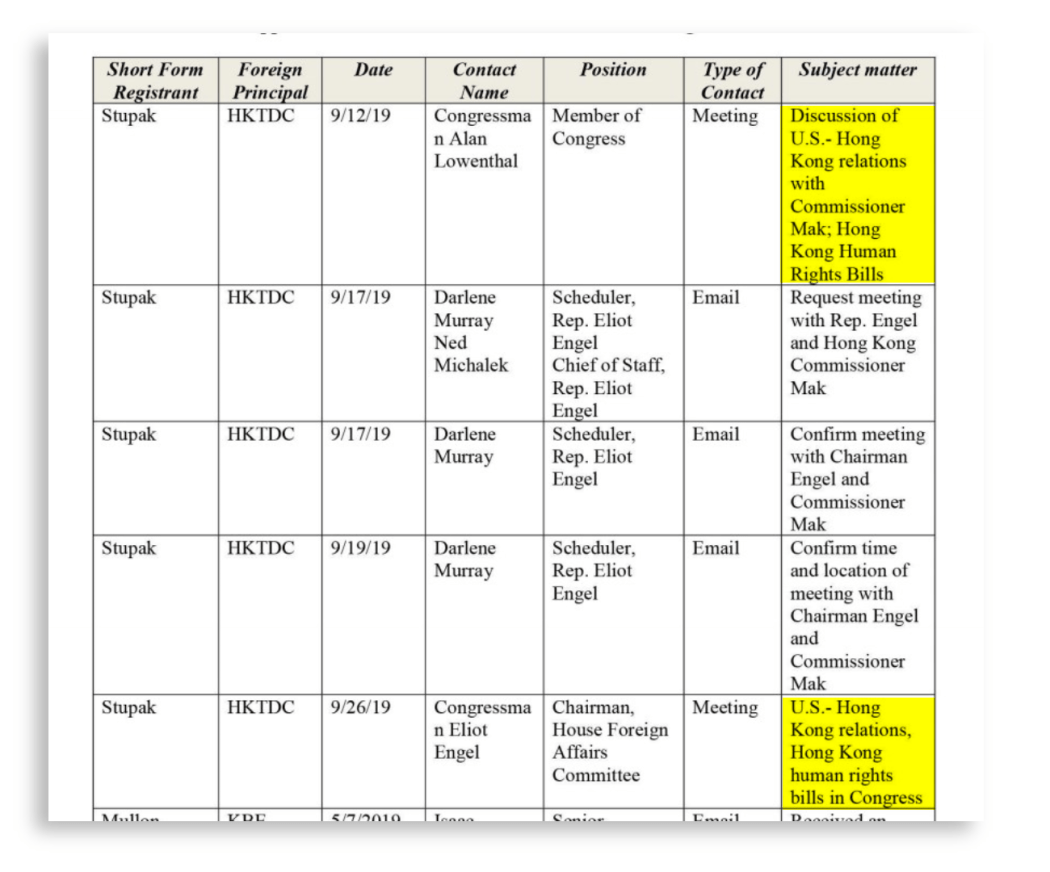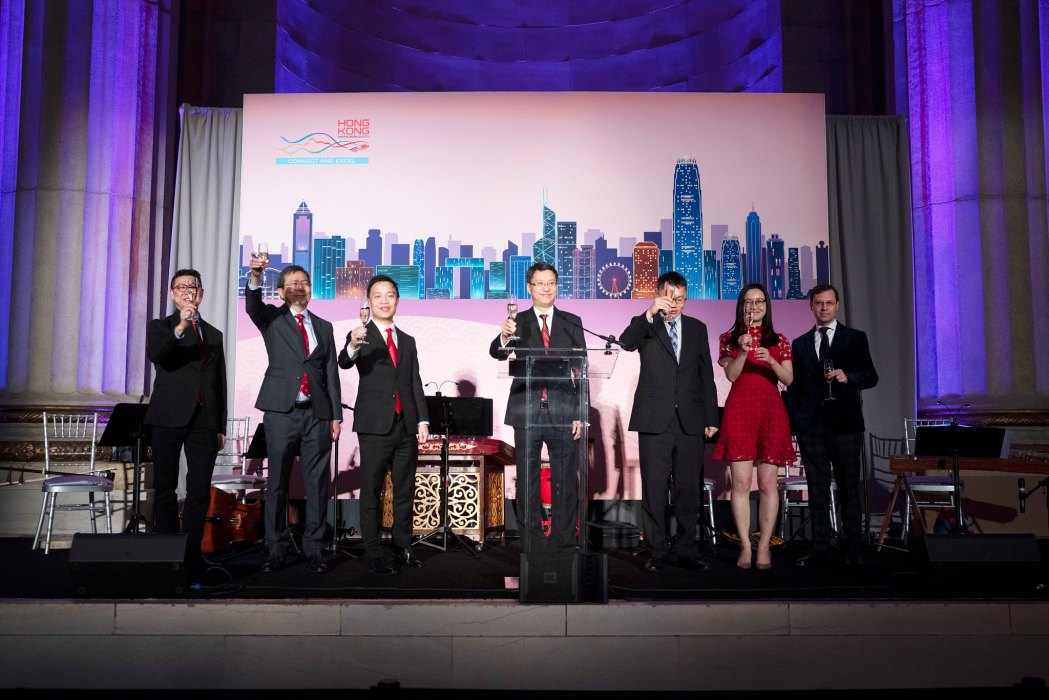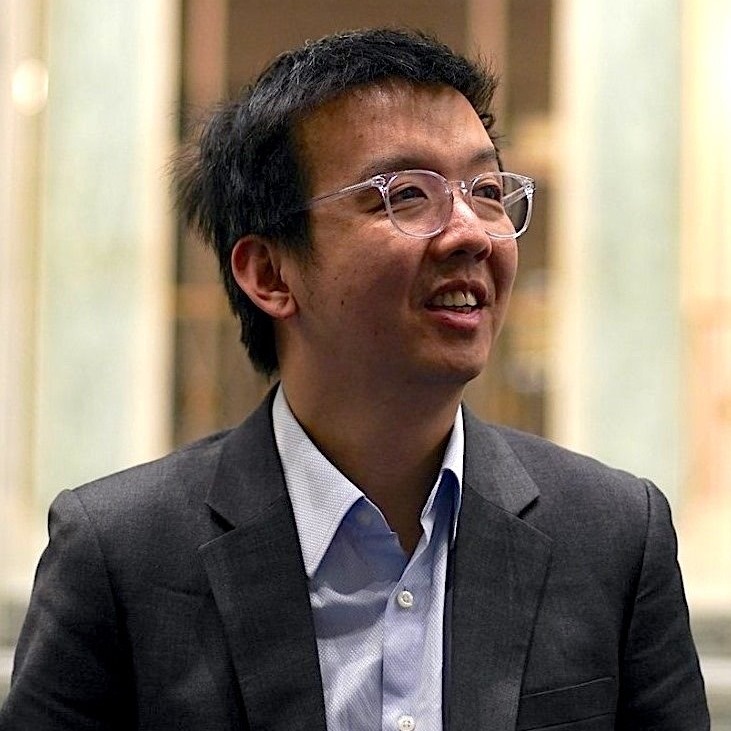When celebrity Hong Kong activists Joshua Wong and Denise Ho flew to the United States to testify before Congress about protests in the city and to lobby its members on a law that paved way for US sanctions against the SAR officials in September 2019, they were not the only ones knocking on Capitol Hill doors.

That same week, Hong Kong government officials and their lobbyists also held meetings behind the scenes with high level members of the American congress in Washington DC over the Hong Kong Human Rights and Democracy Act (the Act). These meetings were set up by lobbyists who – for years – have been hired by the Hong Kong government to do its bidding in exchange for tens of millions of dollars.
See also: Hong Kong gov’t spent millions on failed lobbying bid to defeat US Human Rights and Democracy Act
On the surface, however, a government spokesperson said in a statement given after the activists’ appearance, that “foreign legislatures should not interfere in any form in the internal affairs” of Hong Kong.
HKFP has reviewed years worth of disclosure filings submitted by the Hong Kong Trade Development Council (HKTDC) and its lobbying firms as part of requirements under the Foreign Agents Registration Act (FARA), and found that the Hong Kong government lobbied US politicians specifically on the Act in at least six in-person meetings, after massive protests broke out in Hong Kong in 2014, and again in 2019.
The HKTDC paid close to HK$84 million (US$10.8 million) to US lobbying firms from 2014 to 2020, according to data provided by the Centre for Responsive Politics. It also received a total of HK$374 million (US$48.2 million) from its head office to cover expenses that require FARA disclosure during this time.

In response to HKFP questions about its lobbying efforts, a Hong Kong government spokesperson said its representatives in Washington DC “proactively explained the situation in Hong Kong to our interlocutors and our contacts” and raised “strong objection to the Hong Kong Act.”
Working the hill since 1970
Although Hong Kong is not supposed to have formal relationships with other countries outside of Chinese diplomatic missions under “One Country, Two Systems,” it is allowed under the Basic Law to maintain relationships with foreign governments in fields such as business, trade, tourism and culture to pursue its own interests.
Instead of being an arm of the government, the HKTDC was set up as a statutory government body funded by taxpayers’ money, “dedicated to promoting Hong Kong trade,” its website says. It doesn’t have an office in Washington DC, but often works in tandem with the Hong Kong Economic and Trade Office (HKETO) there.
The HKTDC first opened offices in the US in 1970 to promote business exchange between the territories. Incorporated in New York as a non-profit corporation, the agency hosts dozens of business activities in the US throughout the year, such as receptions, seminars, dinners and roundtable discussions about trading and growing businesses in Hong Kong or Asia. It also spends generous sums placing ads to promote trade conventions in Hong Kong.
Unlike the HKTDC, the HKETOs are official representations of the Hong Kong government in countries where they are based.
Because it is funded by a foreign government and engages in activities considered to be promoting foreign influence in the US, the HKTDC’s US office and firms under its direction or control are required to register as “foreign agents” under the Foreign Agents Registration Act (FARA) to operate legally in the country, while the HKTDC is listed as their “foreign principal.”

Passed in 1938 to address concerns over Nazi propaganda in the US, the World War II-era law requires foreign entities like the HKTDC and companies it hired to do its bidding to make detailed disclosure filings documenting their activities, publications, and any expenses and payments received. Through these records, the public and US policymakers could become aware of activities of foreign influence occurring on American soil.
“FARA is just meant to be a transparency statute and it doesn’t prohibit anybody from doing or saying anything on its own,” Ben Freeman, director of the Foreign Influence Transparency Initiative at the non-profit Center for International Policy, explained.
It requires foreign principals and agents to file disclosure records of their activities, such as lobbying meetings with politicians, but also any activities that try to influence the American public on US policies, such as placing ads or publishing articles in the press.
The Hong Kong lobby
FARA disclosure records that document hundreds of calls and meetings the HKTDC’s lobbyists had with US senators, congressmen and their staffers between 2014 and 2019 also reveal there were at least six in-person meetings to specifically discuss the Act.
Once passed, the law would allow the US to review the special treatment it granted Hong Kong independent from that of mainland China’s. It would also allow the US to impose sanctions against officials deemed to have eroded the city’s autonomy and freedoms.
About a week before the Senate and House Foreign Relations Committees voted on the draft bill, Eddie Mak, the Hong Kong commissioner for economic and trade affairs to the United States, met with California Democratic Party congressman Alan Lowenthal on September 12, 2019, for a “[d]iscussion of U.S.-Hong Kong relations…; Hong Kong Human Rights Bills,” disclosure filings read. The meeting was set up by congressman-turned-lobbyist Bart Stupak, who now works for a lobbying firm called Venable LLP.

The same week, whilst high profile pro-democracy activists Joshua Wong, Denise Ho and Sunny Cheung were in town to testify before the Congressional-Executive Commission on China about protests in Hong Kong, Stupak sent three more emails to fix another meeting for Mak with Democratic Party congressman Eliot Engel.
Then, one day after the bill passed the senate and house committees on September 26, the lobbyist met with Engel, again to discuss the Act, records show. Engel chaired the House Foreign Relations Committee at the time and co-sponsored the house bill. It’s not clear from the filings whether Mak ultimately attended this meeting.
“These meetings happen in the hundreds.”
SAMUEL CHU, HONG KONG DEMOCRACY COUNCIL
On the same day they met, China’s Ministry of Foreign Affairs published a strongly-worded statement condemning the vote led by Engel: “[T]he US Senate Foreign Relations Committee and the House Foreign Relations Committee have blatantly backed the Hong Kong violent radicals up and grossly interfered in China’s internal affairs,” former spokesperson Geng Shuang said. “Such behavior… fully reveals the ill intentions of some people in the United States to mess up Hong Kong and contain China’s development.”
Freeman noted that it would be “rare” for representatives of the foreign government to join lobbyists in their meetings, unless they want to get introduced when the lobbyists scored meetings with officials or politicians in leadership.
The Hong Kong government’s efforts targeting the Act between 2014 and 2019 were a fraction of its years of lobbying efforts in the US. Over five decades, the HKTDC was represented by 26 firms that lobbied for it on issues ranging from the US visa waiver programme, tax legislation, or other matters related to trade, according to congressional data compiled by Legistorm. The HKTDC was represented by five lobbying firms just in 2020.
The other Hong Kong government entity registered under FARA is the Hong Kong Tourism Board, which promotes the city to the US market, albeit on a much smaller budget.
The government spent at least HK$83.9 million (US$10.8 million) on lobbying firms between 2014 and 2020, according to data compiled from FARA records by the Center for Responsive Politics. Due to delayed reporting, the figure is subject to revision and may be higher in reality.
Filings do not disclose if the lobbying firms were paid out of its HK$374 million US budget. The Hong Kong government did not have detailed information on the HKTDC’s expenditure, a spokesperson told HKFP .
For Hong Kong pro-democracy activists who also lobbied US politicians to vote for the Act, the HKTDC’s work on the Hill “is not surprising at all,” said Samuel Chu, founding director of the Hong Kong Democracy Council (HKDC).
“You will find extensive lobbying efforts on behalf of Hong Kong and Chinese businesses on the Hill,” he said. “These meetings happen in the hundreds.”
Unlike the HKTDC, the HKDC’s lobbying activities are exempt from FARA registration as a grass roots organisation. “Because we worked so closely in the process… staff member [would] let us know that someone came into that office,” he said.

The HKTDC was just one of the myriad of entities among the China lobby that tried to influence US policies by making a case for mutual economic interests to American legislators, Chu said. “Instead of them going directly [to say] that ‘we wanted to push back on the human rights and democracy part of the law,’ they send the trade and business people to say that the bill is bad,” said Chu.
“We have raised our strong objection to the Hong Kong Act.”
Commerce and Economic Development Bureau SPOKESPERSON
Venable LLP, the lobbying firm which arranged the 2019 meetings, is registered as a foreign agent for HKTDC, which it first acquired as a new client in 2009, according to its filing to the US Department of Justice. Its 2019 contract with the HKTDC states that the firm would be instructed by the HKETO in Washington DC.
Venable was paid HK$2 million (US$258,000) for a year of “full consultancy services” to promote and protect matters in Hong Kong’s economic and trade interest, as well as to prevent or mitigate any negative impact US policies may cause to the city.

The firm would also “identify key lobbying targets” which may have bearing on policies that affect Hong Kong’s interests in the US Congress, in the US Administration, and in the White House. These targets may include personal and professional staffers, cabinet secretaries, key presidential advisors, senior political appointees and other quasi or non governmental organisations, according to the contract.
In a similar HK$2.8 million (US$360,000) agreement signed with BGR Government Affairs – another lobbying firm – in March 2021, their consultancy objectives for the HKTDC included “promoting awareness of Hong Kong as a separate economic and customs entity.”
But Hong Kong had already lost its special status under US law almost a year ago, when former US Secretary of State Mike Pompeo announced its revocation. The city would no longer enjoy separate treatment from China. The decision was sealed in a presidential executive decision last July.
Chu said he believed the Chinese government is fully aware of the HKTDC’s lobbying activities, “but if they continue to exist, they ought to be just incorporated into the Chinese Foreign Ministry because Hong Kong no longer should have a separate government representative in the US,” he said.
In response to HKFP’s enquiry, a Hong Kong government spokesperson said the city’s special status “is a basic principle under ‘One Country, Two Systems,’ it is not granted or revocable by an individual country. The HKSAR Government will do its utmost to safeguard it.”
The office of China’s Ministry of Foreign Affairs in Hong Kong did not respond to HKFP’s email and fax enquiries.
‘No nonsense, relationship driven’
The lobbyists hired by HKTDC first began to arrange meetings with US politicians to specifically discuss the bill in December 2014, two weeks after it was first introduced to Congress by Senator Marco Rubio, when the Umbrella Movement — during which thousands of protesters occupied main roads around the Hong Kong legislature demanding universal suffrage — was coming to an end.

The proposed bill received limited press coverage in Hong Kong, but lobbying firm FTI Consulting, which has an office in the city, quickly got to work and arranged four meetings on the topic in the five following months with current and former senators and congressmen, filings showed.
In a meeting arranged by former congressman Bud Cramer to discuss the House version of the bill, the commissioner to the HKETO at the time, Clement Leung, met with former congressman Daniel Lipinski in March. FTI and another firm billed the HKETO for at least 11 other outreach attempts during the period as “made contact,” “email,” “voice message,” or “calls.”

While FARA demands extensive documentation on lobbying activities by firms hired by foreign governments, it does not make clear the exact level of detail that documentation must include.
“Nobody that they lobbied voted against the bill.”
Samuel chu, hong kong democracy council
As a result, most outreach descriptions remain vague. A November 2019 meeting arranged by Akin Gump et al., for example, was described as a discussion on “Ongoing U.S.-Hong Kong relations and Hong Kong U.S. legislation.” Another firm, BGR Government Affairs, recorded in 2019 over 100 meetings, emails, or calls on the topic of “U.S.-Hong Kong Relations.”
Freeman said such meetings are typically fairly quick, no nonsense and are relationship-driven. Due to the fact that many lobbyists are former politicians, “they can just call up their old friends and their own colleagues on behalf of whoever their clients are,” he said. Politicians take lobbying meetings constantly throughout the year and address any concerns whenever they arise.
But entities labelled as foreign agents “shouldn’t be a scarlet letter,” he said. “They’re having meetings with members of Congress and they’re trying to get their voices heard.” On the other hand, even when a legislation — like the Human Rights Act — had bipartisan support, politicians would meet with lobbyists “just so they know what the opposition is thinking.”
It would be a mistake “to say that just because a ‘foreign agent’ is meeting with a politician then that’s a bad meeting or that just because of who they are, there’s something nefarious going on,” he said.
In a response to questions from HKFP, a spokesperson from the Commerce and Economic Development Bureau — which oversees the ETOs — said: “the ETO in Washington D.C. has, through various channels, proactively explained the situation in Hong Kong to our interlocutors and our contacts, actively rectified misunderstandings and rebutted misreporting [in relation to the Act.] “

“We have raised our strong objection to the Hong Kong Act, which was unnecessary and unwarranted and would harm the economic and trade relations and common interests between Hong Kong and the US,” they said, adding that the ETOs in the US maintains regular contact with officials in the White House, State Department, Department of Commerce, members and staffers of Congress, as well as academics and those in the business communities.
The Chief Executive Office’s did not respond to HKFP’s enquiry on whether the chief executive authorised or knew about the HKTDC’s lobbying efforts.
HKFP also reached out to lobbyists, their firms and US politicians mentioned in this story by email or through intermediaries for comment, but received no responses at the time of publication. Only Stupak from Venable declined to comment.
The Hong Kong Human Rights and Democracy Act became law on November 27, 2019.
To pro-democracy activists, however, their adversary’s lobbying efforts are also a signal of their own success. “The fact that [the Hong Kong government] took the time to come in and actually voice, made it clear to us that this was a tool that really was effective as far as pushing back, ”Chu said.
“And nobody that they lobbied voted against the bill,” he said. “It obviously was not successful.”
See also: Hong Kong gov’t spent millions on failed lobbying bid to defeat US Human Rights and Democracy Act
Support HKFP | Policies & Ethics | Error/typo? | Contact Us | Newsletter | Transparency & Annual Report | Apps
Help safeguard press freedom & keep HKFP free for all readers by supporting our team

LATEST FROM HKFP
HKFP has an impartial stance, transparent funding, and balanced coverage guided by an Ethics Code and Corrections Policy.
Support press freedom & help us surpass 1,000 monthly Patrons: 100% independent, governed by an ethics code & not-for-profit.










